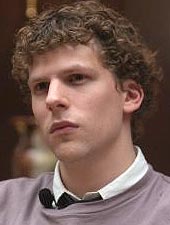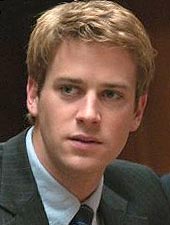 Raja Sen reviews The Social Network. Readers can also send their reviews here.
Raja Sen reviews The Social Network. Readers can also send their reviews here.
There is a sequence in David Fincher's magnificent new film that, like the invention it talks about, changes everything. A savage quip-eat-quip script is suddenly, without warning, replaced by a shot of two teams rowing down the Thames.
Made sublime by rocker-composer Trent Reznor riffing magically on Edvard Grieg's In The Hall Of The Mountain King, the sequence lasts barely two minutes. It is a race, and as the camera -- so far having gazed finely, accurately and hauntingly on young men sitting in dormitories and law firms -- tilt-shifts its way to a strikingly shallow depth of field, we find ourselves simultaneously both against and cheering a certain team.
And that, ladies and gentlemen, is The Social Network -- a David Fincher masterpiece that dares you to choose a side, and to then stick by it. Aaron Sorkin's rapier-sharp script snakes through allegiances with such glorious disloyalty that everything is questioned, and everything must be. Including how much of ourselves we end up -- not losing or finding, but investing -- in a website that doesn't care about us.
Going by Sorkin's script -- one that crucially chooses high drama over actual fact, even while based on a bestselling book -- neither does Mark Zuckerberg, creator of Facebook. According to this version of the truth, Zuckerberg (played by Jesse Eisenstein) is driven by a desperate need to belong. Due to a seemingly defiant lack of social grace, he is miles away from acceptance, and so decides to rewrite the status quo. Or is it Relationship-Status quo?
Zuckerberg is not a popular man, and the film goes on to paint a highly unflattering picture of the world's youngest billionaire. Fincher and Sorkin deliciously dissect his every insecurity, forever questioning his motives. And yet the version of the man they create invariably provokes both awe and fascination, which is what makes The Social Network one of the most important films of its generation. Because it takes the very notion of morality and puts it up there, blue text on white, the audience left to choose to 'Like,' or not. What is most important, in this dizzyingly evolving information age: An idea? Drive? Originality? Packaging? Innovation? Honour? Ambition? Intelligence? Greed? Getting there first? Or are we all to make our own convenient quick-mix of the above, doing whatever it takes to get what we want?
Because it takes the very notion of morality and puts it up there, blue text on white, the audience left to choose to 'Like,' or not. What is most important, in this dizzyingly evolving information age: An idea? Drive? Originality? Packaging? Innovation? Honour? Ambition? Intelligence? Greed? Getting there first? Or are we all to make our own convenient quick-mix of the above, doing whatever it takes to get what we want?
Cutting back and forth between early collegiate innovations, heady days of website success and much legalese encountered across unrelenting boardroom tables, the film tells a story we either know or can guess from the get-go: Zuckerberg is being sued, by everyone. Friends become foes, exes bite impactfully, and a lot is buried under the vault of dollars. And while he might well be sinner extraordinaire in some eyes, his own just blaze with the often-frightening fury of a man who wants to do even more.
And while it sounds like a conversational thinko film, it plays out like an edge-of-the-seat thriller: just the best-written one in several years, every facet buffed to perfection.
Eisenberg, last seen in Zombieland, does phenomenally well as Zuckerberg, creating a character so genuinely full of himself that we dare not peek behind his braggadocio. In a playful, surprisingly adept performance, Justin Timberlake plays Sean Parker, co-founder of Napster, a rockstar taking Eisenberg under his wing and showing him how best to yell cusswords as he soars. Armie Hammer sneakily filches many a scene as he doubles up as the Winklevoss twins, armed with a moral code so stubborn it can only exists in a bubble. Zuckerberg, as can be imagined, pops it.
But nobody gets the shaft quite like good buddy and former Facebook CFO Eduardo Saverin, played exceptionally by Andrew Garfield. Accidental Billionaires, the book Sorkin adapts from builds itself around Saverin's version of the facts, and so it comes as no surprise that Saverin emerges as the film's moral compass. Yet what Garfield manages to do -- hapless and hot and graceful and geeky all at once -- is turn the character into a hero. It appears impossible to leave his side even if the film may, and this is the performance that bestows the film with its heart. This is a film highlighted by its dialogue, The West Wing writer Sorkin bettering his own stellar body of work as characters here engage in tremendously intelligent talk, as uber-caustic as it is uber-cool. The repartee is never one-sided, often painting everyone too clever to be real. This would be a flaw were the script not as tightly honed: in the construct as it stands, Sorkin theatrically endows his characters with words of power, weakness, flourish. Wonderful words, words that allow the filmmakers to tilt-shift, if you will, the very balance of a scene, the very dynamic of a conversation. This truly is a script for the ages.
This is a film highlighted by its dialogue, The West Wing writer Sorkin bettering his own stellar body of work as characters here engage in tremendously intelligent talk, as uber-caustic as it is uber-cool. The repartee is never one-sided, often painting everyone too clever to be real. This would be a flaw were the script not as tightly honed: in the construct as it stands, Sorkin theatrically endows his characters with words of power, weakness, flourish. Wonderful words, words that allow the filmmakers to tilt-shift, if you will, the very balance of a scene, the very dynamic of a conversation. This truly is a script for the ages.
And, as befits a fantastically written script, it stays consistently funny. The wordplay crackles, and the eminently quotable drollery lightens the mood masterfully: it is only as the film winds down to a close that it becomes clear just how darkly incisive it is. Pushed to a desperate corner and contemplating violence, one of the Winklevosses -- disparagingly referred to as the Winklevii by Zuckerberg -- owns my favourite line: "I'm 6'5", 220 pounds. And there's two of me." Perfect.
David Fincher has always made terrific stories about loners -- Fight Club being the gem of the pack -- but this film, where his auteur trademarks and flash are traded in for the cerebral and the currently relevant, may likely be the masterpiece he's remembered for.
The Social Network is a mammoth accomplishment, a feat of craft and smarts and extreme generational significance. The maker -- with Sorkin and Reznor and that cast -- deserves to take a bow.
For this is the history we're living today.
Rediff Rating: 





